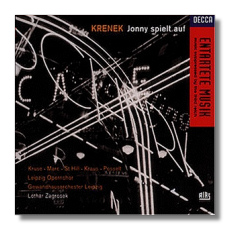
The Internet's Premier Classical Music Source
Related Links
- Latest Reviews
- More Reviews
-
By Composer
-
Collections
DVD & Blu-ray
Books
Concert Reviews
Articles/Interviews
Software
Audio
Search Amazon
Recommended Links
Site News
 CD Review
CD Review
Ernst Krenek

Jonny spielt auf
- Kruse (Max)
- Marc (Anita)
- St. Hill (Jonny)
- Kraus (Daniello)
- Posselt (Yvonne)
Leipzig Opernchor
Gewandhaus Orchestra Leipzig/Zagrosek
London 436631-2
I came to Krenek's music through his less-accessible works. I heard an abridged version of his one "hit," Jonny spielt auf (1927), long after I had found the string quartets, the harp sonata, Lamentatio Jeremiae, and Santa Fe Timetable. In effect, I had built an image of Krenek as a virtuoso, strongly intellectual composer, an image which Jonny contradicted. I've never taken a shine to this work. It seems to me far more important historically than artistically, and thus it strikes me as appropriate that London has released it as part of its "Entartete Musik" series, dedicated to music suppressed by the Third Reich.
Let me say that the performance is first-rate. The singers may not have Pavarotti- or Studer-like voices, but they fully meet the challenges of the vocal writing. Zagrosek and the Leipzig personnel deliver a meticulous account. The question comes down to whether you really want to hear this opera.
I find the work fairly irritating on several grounds. First, it juxtaposes styles without an ability to integrate them, unlike the contemporary operas of Weill, which also mix "high" and "low." The jazz elements (really white dance band music – imagine Lawrence Welk filtered through Berg) rub up against pretty standard modernist stuff. Furthermore, at no point does the music ever really catch fire, as Weill's Der neue Orpheus, written two years earlier, does from its opening bars. This effects a kind of musical aimlessness, and it doesn't surprise me that, after this success, Krenek began a fairly intensive search for a style that expressed his artistic personality. He found it in Schoenberg's twelve tones, and within that compositional neighborhood became a real master, too little known.
Second, the composer's own libretto is just plain undramatic. One cares little about the characters, possibly because they aren't characters as much as symbols of various artistic types. Max, the modern composer, is a tortured, agoraphobic soul who needs the constant nurturing of Anita, his muse and the type of artist who reveres art (and therefore Max). Jonny is the artist as pure id – the pulse that quickens art. Daniello is the egotistical, cynical, brainless virtuoso for whom art is merely the means to mass adoration (he gets popped off in the end, presumably to applause). This leaves us with a rather thin fable I suspect interests mainly other self-absorbed artists. Legendary New Yorker editor Harold Ross used to warn his staff against writing fiction or drama about writers on the sensible grounds that their activities weren't all that interesting to non-writers. If you try to take these die-cuts as people, Max comes off as a whiner, Anita a masochist for sticking with Max, Jonny a sociopath, and Daniello… also a sociopath, come to think of it. Hardly the stuff of gripping drama. Compare this to Weill and Brecht, also in the business of fables, but capable of creating characters with recognizable motives and failings to which we find ourselves susceptible.
I know, I hear you practically screaming, "Well then, smarty-pants, why was this such a hit? Was everybody but you an artistic cretin?" I think the pseudo-jazz elements had something to do with it, despite their infrequent occurrence in the work, as well as the comfort of the late 19th-century-derived idiom of the rest of the piece. Also, there's the "delicious thrill" of interracial coupling (Jonny is an American black). At any rate, the reviews of the day fastened on these "scandalous" aspects of the work. The production was apparently a wonder of Expressionist scenic design. Very little of the furor surrounding the opera seems to have been occasioned by the music.
As I said, London has produced a superb recording. Too bad they went all out for this, rather than for the Lamentatio.
Copyright © 1997, Steve Schwartz


















